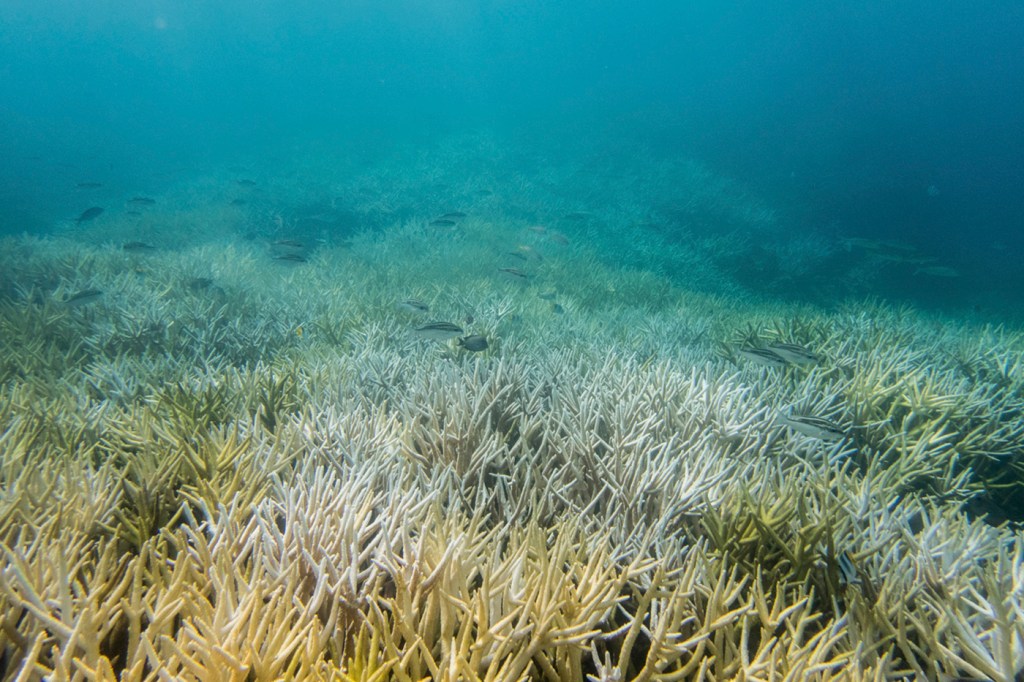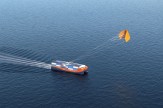Northeastern marine science professor Kathleen Lotterhos says U.N. ocean and cryosphere report poses evolutionary challenges for marine life.

It is known: Climate change means melting ice sheets and glaciers, supercharged storms, and rising sea levels.
But what you might not have known is that the effects of climate change are also seeping down into the ocean’s chemistry.
A new United Nations report warns that the oceans have sponged up about a quarter of the total atmospheric carbon dioxide released from burning fossil fuels since the 1980s. It’s changing the chemistry of the ocean at different depths, the report says, creating dangerously acidic and oxygen-depleted conditions for marine life.

Kathleen Lotterhos, a Northeastern professor of marine and environmental sciences. Photo by Ruby Wallau/Northeastern University
Kathleen Lotterhos, a Northeastern professor of marine and environmental sciences who studies how these organisms cope with the changing ocean, says that the rapid changes in composition and temperature worsen the spread of invasive species and a disease that hinders the ability of shelled species to grow their shells. In the current climate, she says, it is important to think about how organisms such as plankton, fish, and oysters can evolve and genetically adapt to their changing environment.
“There’s definitely limits and constraints on whether these organisms have the capacity to evolve,” says Lotterhos, whose work in evolutionary genomics focuses on how marine organisms interact with the rapidly acidifying conditions in the ocean. “But we can’t ignore that evolution and genetic adaptation could hold a lot of hope for species to adapt through evolutionary processes.”
Released Wednesday by the U.N. Intergovernmental Panel on Climate Change, the scientific assessment projects a grim future for the ocean and regions covered with ice—snowpacks, frozen soil, and icy lakes included. The report says overheating the ocean will threaten fish stocks and power even rainier superstorms. And, it warns, even more of the planet’s ice and snow will melt, rising seas to even higher levels and at faster rates.

Daniel Douglass, a Northeastern associate teaching professor of marine and environmental sciences. Photo courtesy of Daniel Douglass
The global ocean, circulating massive amounts of water, salt, and nutrients with river-like currents, is one of the major reasons Earth has been able to withstand global warming. But the new U.N. report says the ocean has absorbed more than 90 percent of the extra heat generated since the 1970s, and it can’t keep up.
That warming also triggers important effects in frozen regions, which together team up with the ocean to regulate the global climate. Daniel Douglass, a Northeastern associate teaching professor of marine and environmental sciences who has conducted research on glacial geology and climate science, says that because the glaciers and the ocean are so vast, they react to changes slowly over decades. We can now see the warming that occurred in Greenland and Antarctica a decade ago, he says, translated into the rising seas.
According to the U.N. report, the observed ocean warming and mass ice sheet losses are practically irreversible.
“The large amounts of inertia associated with the ocean mean that even if we waved a magical wand and got global greenhouse emissions down to zero today, we would still continue to see changes in these systems for a long period of time,” Douglass says.
The report, prepared by more than 100 scientists from over 30 countries, packs nearly 7000 studies into 900 pages. Lotterhos says such a comprehensive body of work—the first by the U.N. climate panel to focus solely on Earth’s oceans and icy regions—will help her design experiments to test how climate change will affect marine life. The lack of integrated ocean data, she says, is one of the main challenges to answer that question.
“Science is not about what one scientist or one study shows,” Lotterhos says. “Each of these studies cited by the IPCC alone might not be groundbreaking, but together they send an important message: that we need to do something about carbon.”
The report released Wednesday also warns of an “emerging issue” known as marine heat waves. Their frequency, the report says, has doubled since the 1980s, creating serious repercussions for marine ecosystems. Douglass says including such emerging issues in climate reports shows how valuable it is for scientists to understand uncertainty to measure and project the effects of climate change. It’s something that sits at the core of such robust scientific assessments.
“There was really not much in this report that was surprising given the predictions that were made 15 years ago,” Douglass says. “All of that is now being borne in the observations of what has actually been transpiring.”
For media inquiries, please contact media@northeastern.edu.





